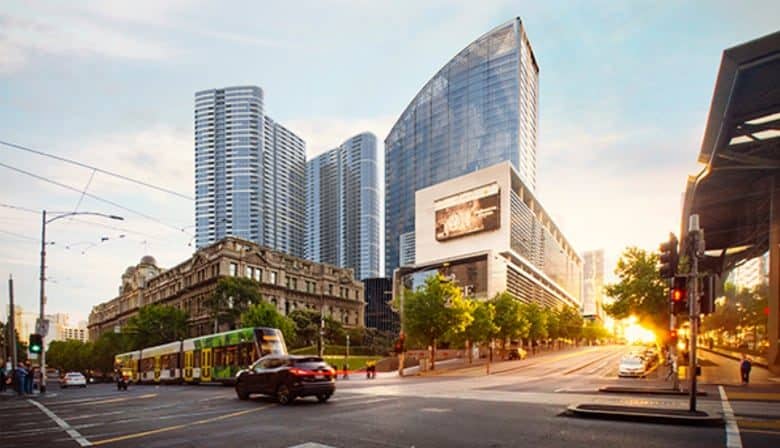
Korea’s NPS bought the Melbourne Quarter Tower from Lendlease in July this year
New office investment hotspots are emerging across the Asia Pacific region, according to a report released today by the asset management affiliate of Germany’s Deutsche Bank, as technology and life sciences businesses fuel demand for affordable and accessible work spaces outside of traditional business districts.
Frankfurt-based DWS sees Brisbane, Melbourne and Sydney in Australia, along with Seoul in South Korea and Japan’s Fukuoka are offering attractive investment returns in APAC as new economy enterprises turn to premium assets with good transport connectivity, lifestyle components and cheaper rents.
“We see these locations offering attractive office investment opportunities with the potential for returns well in excess of the traditional city core,” the report read. “These locations are often the home of rapidly expanding business clusters – centered around growth sectors such as technology, gaming or life sciences – and supported by improving infrastructure.”
It said the outlook for these emerging office locations will remain strong as new economy sectors grow with start-ups and tech enterprises turning to districts which combine residential and office locations, while life sciences clusters look for sites which can accommodate innovation campuses.
Aussie Fringes in Style
In Australia, DWS pointed to the success of North Sydney and Macquarie Park in attracting major tech and media firms like Microsoft through their combination of quality office stock, more affordable rents and connectivity options which put them within 20-minutes of Sydney’s traditional CBD.

Koichiro Obu, head of real estate research for Asia Pacific at DWS
Earlier this month, Singapore’s Keppel REIT subscribed to a theory similar to DWS’ as the SGX-listed trust announced that it had agreed to purchase the Blue & William office project in North Sydney for A$327.7 million ($234.1 million).
In explaining the rationale for the deal to investors, the trust’s manager said, “North Sydney is New South Wales’ second largest office market after the Sydney CBD, and is a location of choice for diverse industry sectors including technology, media and telecommunication, as well as the professional services and insurance sectors.”
Further south, locations on the fringe of Melbourne’s central business district also cater to creative and tech firms competing for youthful workforces which prefer offices closer to where they live, the report said.
During July, Korea’s National Pension Service (NPS) placed an A$1.2 billion bet aligned with DWS’ hypothesis, when it agreed to purchase the 34-storey Melbourne Quarter Tower from Lendlease.
In explaining the appeal of Lendlease’s project in the emerging Melbourne Precinct, Scott Kim, then head of real estate investment for the NPS, said, “The COVID-19 pandemic is accelerating flight to quality trends in the office sector and this asset fits our strategy to invest in the highest quality buildings in desired locations with strong tenant demands.”
Brisbane’s Fortitude Valley which lies 2.5 kilometres (1.55 miles) northeast of the traditional business district of Queensland’s capital city, has caught big firms’ attention as the city undergoes major urban renewal with at least A$10 billion worth of infrastructure projects underway.
Seoul Suburbs, Japanese Hubs
In Asia, DWS sees the South Korean city of Pangyo emerging as a tech-driven office location less than one hour south of Seoul by train. The planned city in Gyeonggi province, which surrounds the capital is home to the Pangyo Techno Valley, accommodates software firm Kakao, game developer Nexon and life sciences firm CHA Group.
The neighbouring city of Bundang, has become a hub for life science firms as well as for the auto and manufacturing sectors.
The Pangyo Techno Valley was home to one of Asia’’s largest office transactions in the first nine months of this year when Korea Real Estate Investment & Trust purchased the H Square building from asset manager Koramco for $628.2 million in the second quarter.
Japan is also seeing more businesses venture beyond Tokyo, with the Tenjin and Hakata submarkets in Fukuoka, in the northern part of Kyushu Island, among the major beneficiaries of this commercial expansion.
DWS pointed to Google’s recent announcement of plans to open its second Japanese office in Tenjin as evidence of the growing importance of Japan’s sixth largest city to fast-growing tech firms, with that demand boosting the office outlook.
In explaining the appeal of these New Economy centres in Asia Pacific, DWS said, “above average rental growth and yield convergence in this type of location are anticipated over the long term, further supported by better-quality office stock in cities such as Melbourne, Brisbane, Pangyo, Bundang, Tenjin and Hakata.”
Leave a Reply